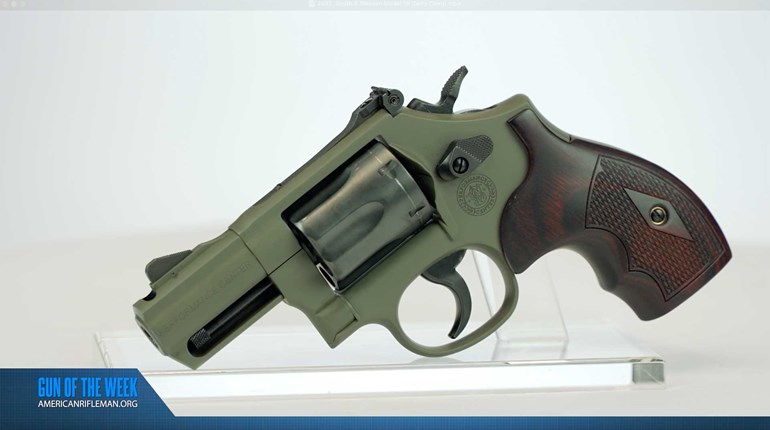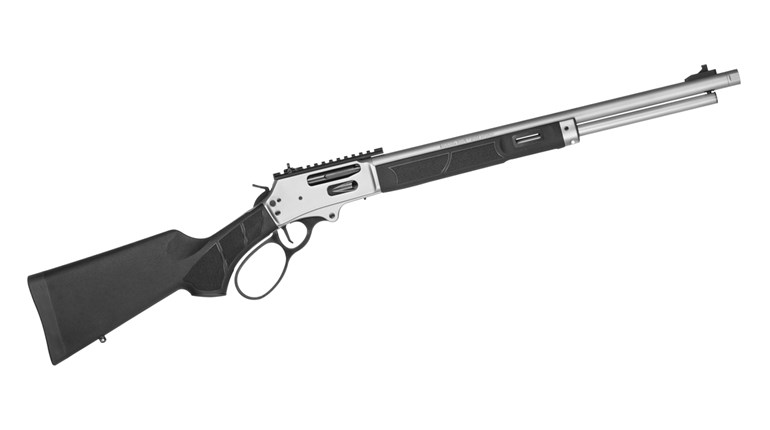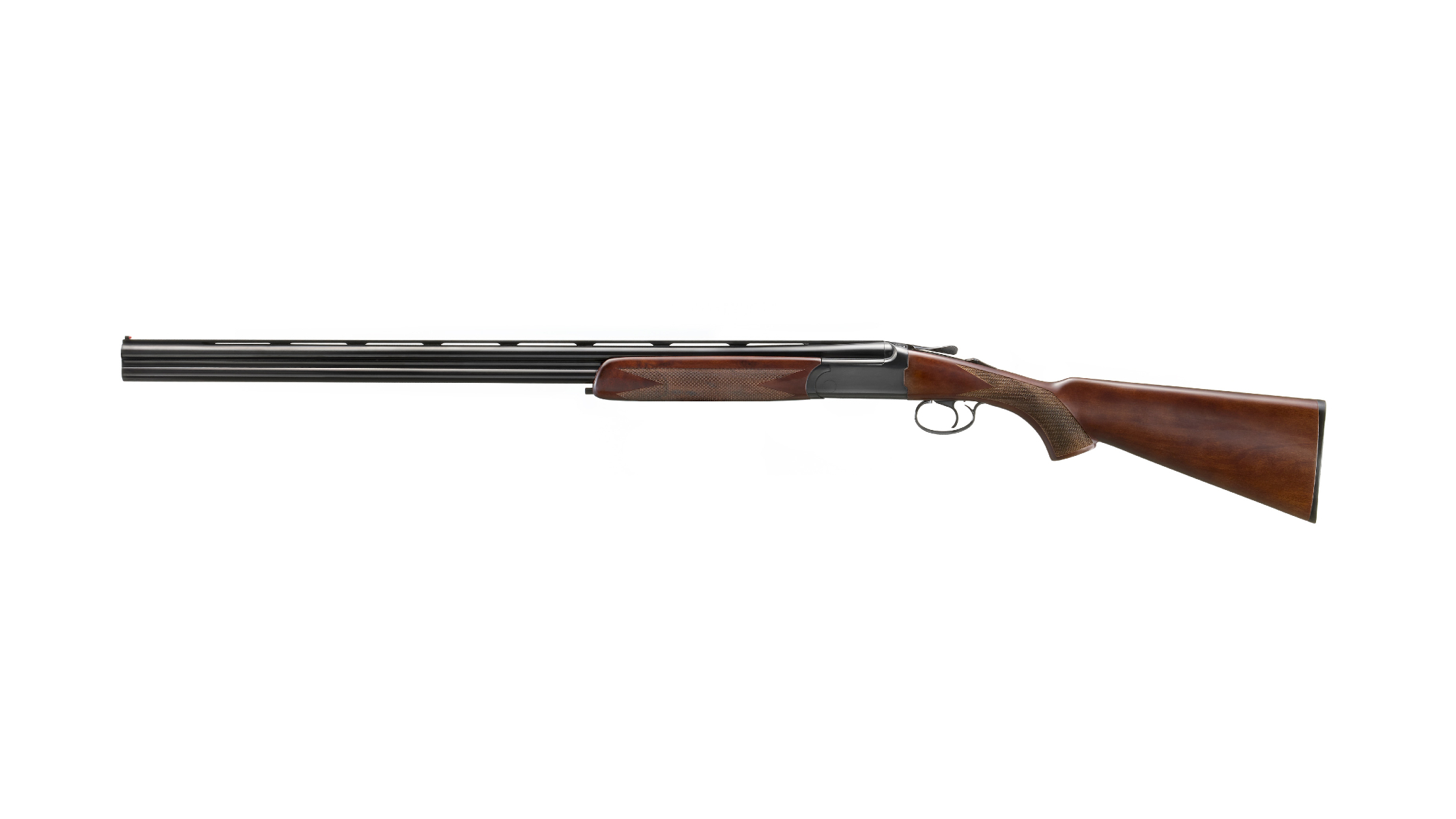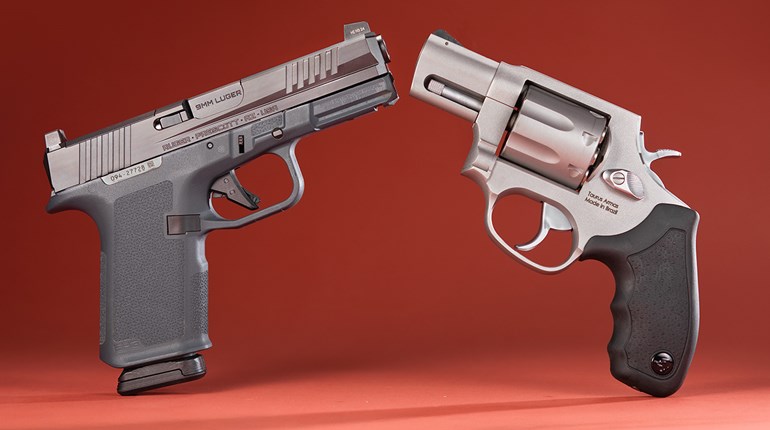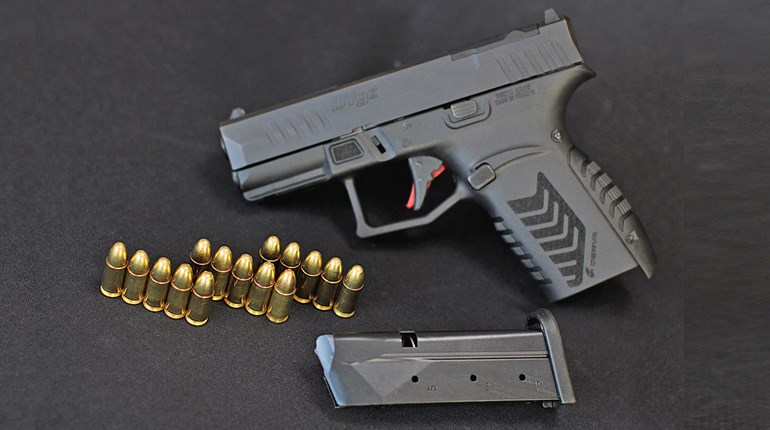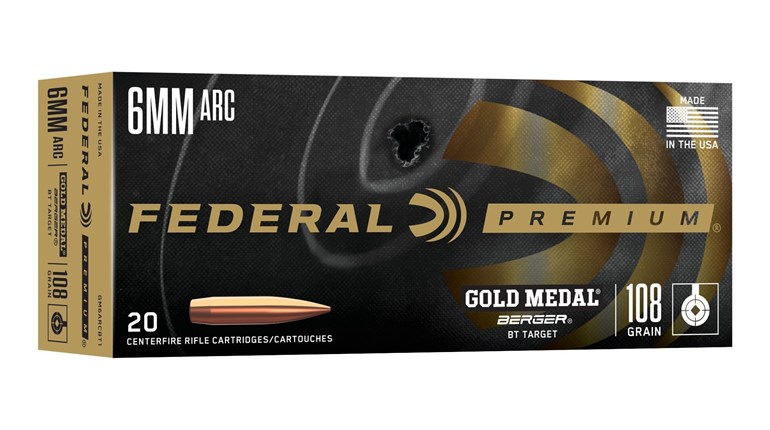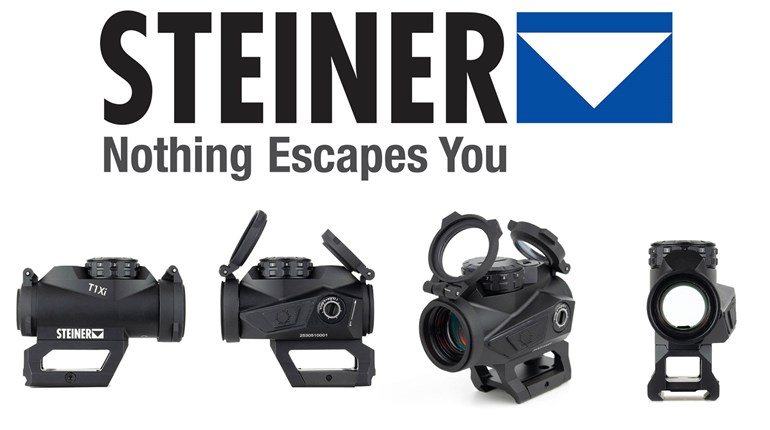
Smith & Wesson has a new gun out, called the Equalizer—a name some in the Second Amendment world find over-the-top. Me? I think it will help sell these pistols.
My mother likes to tell the story of when I, a mere tot at the time, had apparently had quite enough of my older brother’s harassment. I picked up a stick and made him back off. She laughs about how I needed an equalizer against my bigger, stronger brother.
I apparently never lost my love of tools that can even the odds, and a firearm is the ultimate equalizer. I’m not the only one who thinks this—most people state self-defense as their primary reason for buying handguns. They need an equalizer, and the smaller or weaker they are, the more they need it.
But, no matter how much they might need it, when novices encounter semi-automatic pistols, there’s an intimidation factor and an obvious learning curve to overcome. Some people struggle to rack a semi-automatic slide. This derives in part from lack of familiarity with the correct method, but it can also be from lesser hand strength, medical conditions or smaller hands.
The Equalizer, like its predecessors from the M&P Shield EZ line, will help overcome these barriers, since it’s about 35 percent less difficult to rack this slide than usual (per the company’s measure). The Equalizer’s slide is Armornite-coated steel, and it both looks nice and is highly functional, with very deep serrations to ensure you get that grip you need for racking. These serrations are significantly better than the EZ’s—in fact, they’re almost too much. The Equalizer’s slide also has little “ears” at the back that will help keep your hand from sliding off. Finally, the rear sight is designed such that those who can’t rack the slide even at the lighter level can rack against a desk or other hard surface. So, novices and those with reduced hand strength should feel better able to handle this gun as they consider a purchase.

The Equalizer is the multi-purpose, micro-compact 9 mm you might get by throwing a Shield EZ and a Shield Plus in a metaphorical blender. You get the frame and the easier-racking trait of the EZ with the increased-capacity, double-stack magazines of the Plus. Whereas the EZ comes with only two, eight-round magazines, the Equalizer comes with three magazines of 10-, 13- and 15-round capacity; if you happen to have a Shield Plus at home, its magazines will work in the Equalizer as well. The EZ’s magazines are easier to load, but Smith & Wesson wisely included a Maglula UpLula magazine loader with the Equalizer, so those who like to spare their thumbs some work can still load quickly and easily.
The three included magazines help make the Equalizer into a multi-purpose gun. With the flush-fit 10-rounder, concealed carry is easier. With the 13- and 15-round magazines, you have more utility for the range and home defense. This is a selling point for me, as with any gun that will accommodate a multitude of magazine options. Carry the Equalizer all day with the 10- or 13-round magazine in and simply swap out to the 15-round before you go to sleep at night or when you head to the range. Another option is to carry the flush-fit 10-rounder in the gun, but the 15-rounder as your reload.
Adding to its multi-purpose utility are the three-slot Picatinny rail below the barrel and the optics cut-out in the slide. If you want to add a flashlight, laser or Shield RMSc/Holosun 507K-footprint optic, the Equalizer makes it easy, and the optic can co-witness with the standard three-white-dot sights, as is ideal.

In shooting, the Equalizer feels much as you’d expect from a modern, polymer-frame 9 mm. It shot levelly with decent group sizes, and recoil does seem to be less intense than comparable-size guns in the same caliber, despite that lightened recoil spring. The 18-degree grip angle helps get the gun on target quickly and naturally, and the grip texturing is aggressive enough without being problematic. The reversible magazine-release button was a bit forward for me to easily actuate with my small hands, but, once accomplished, the magazines all dropped without issue every time.
The Equalizer is internal-hammer fired, which some might claim makes for a better trigger. I didn’t find anything exceptional about the trigger feel, however. It has a standard amount of travel—perhaps a little too much—a nice break, and a reasonably discernible reset. The reset click, while audible, is pretty quiet, and I didn’t think the feel was the most tactile, either, so I’d put the overall trigger experience in the mushy middle. Nothing great, but not bad, and certainly serviceable. Smith & Wesson’s rep told me the pistol’s trigger pull weight should be 4.75 pounds, plus or minus 1.25 pounds. My lowest measurement was 5 pounds, 7 ounces, and my average closer to 6—within the ballpark of their measurements, but heavier than I expected. However, measurement methods could account for this discrepancy, as even moving the instrument down further on the trigger can change the result. Regardless, for most people’s purposes in owning this gun, the stock trigger is more than adequate.
In 500 rounds, I experienced only two failures, both times using as diverse a mix of ammo as I could manage to get in the magazines and firing rapidly (a tough test for many guns). When I removed the lightest bullet weight of ammo from the mix (having run out of it first), I did not experience any further malfunctions.
Ergonomically, I did find the grip angle to be right for natural aiming. The backstrap safety is continually problematic for my hands, however. A high grip on any hand- gun is encouraged because it reduces muzzle flip, but when I grip this gun as high as I naturally want to, I can easily miss fully activating the grip safety. The primary force point is between the thumb and first finger, but with my smaller hands, that point on my thumb tucks right into the area between the grip safety and the tang. I also feel like the backstrap should continue perpendicular to the slide longer than it does—the arc between the top of the backstrap and the tang is more pronounced than is ergonomically ideal. Essentially, the Equalizer, like its EZ counterparts, makes it difficult to have an ideal high grip—at least without extra attention. (This similarity should be expected since the Equalizer uses the EZ 9’s frame.) Newer gun owners may learn a less-than-ideal hold by grabbing the top of the grip safety instead of just below the tang and suffer more muzzle flip than necessary as a result.
One-handed shooting was unpleasant, as it always is for me with any polymer handgun chambered in 9 mm or larger, but manageable. Nothing caught my attention about this gun versus others when it came to one-handed shooting.

The gun’s metal, M&P-style, white-dot sights are perfectly acceptable, especially for indoor shooting. I tend to prefer more high-visibility sights, especially for outdoors and especially as my eyes are aging. I imagine many people purchasing an Equalizer would prefer something more visible, too, which is no doubt part of the rationale for the slide’s optics cut-out.
In terms of where a round might eject, inconsistency abounds. If you have a buddy in the bay with you, they’ll want to stand to your left; anywhere on the right is subject to bombardment. Again, fairly typical.
Disassembly of the Equalizer is like the EZ, and those unfamiliar with the process—newer gun owners in particular—are also susceptible to a few pitfalls here, as they need to avoid activating the grip safety and pulling the trigger. Hopefully no one would be pulling the trigger in this process unless specifically instructed to do so for disassembly, but the grip-safety issue is not so intuitive. The natural thing to do when field-stripping your gun for the first time is follow along with the manual’s step-by-step instructions. According to this manual, you bring the slide back and activate the slide lock, then press the takedown lever to perpendicular; next, you deactivate the slide lock and bring the slide forward. Sounds easy, but the slide will not continue forward off the gun if you depressed the grip safety during this process—and a note lets you know this information after you’ve already read the other steps. People new to this gun are going to be holding it as normal and working the slide as they follow along, such that they will be very likely to activate that grip safety as they attempt disassembly—and their slide will be locked up before they even read that note. (As a former technical editor, I’m appalled, but that’s also my reaction to most firearm manuals, and those from Smith & Wesson are actually better than most.)
Fortunately, the fix is an easy one. Simply grab the gun without activating the grip safety—which feels awkward, but is certainly possible—and wiggle the slide back and forth as you push it forward. Voilà, you have a working slide that you can now push forward off the gun. Then you just remove the guide rod and captive spring, lift out the barrel and you’re ready to clean.
My ultimate take on the Equalizer is that it is exactly what it purports to be. It’s a good gun for most people’s needs, and a great gun for new shooters and those who struggle with standard semi-automatics. It levels the playing field for those who might not otherwise feel comfortable enough to shoot and/or carry a semi-automatic. It’s also a clear step up from the EZ line in terms of capacity and multi-purpose functionality, and I personally like shooting it better than the Shield Plus because of less felt recoil. I’ll recommend the Equalizer particularly to new shooters and those with weaker hands—two sizable demographics of people whom I believe will appreciate and even love this pistol for making their gun-ownership journey easier. But, I could also recommend it to anyone who simply needs a very reasonably priced, reliable, multi-purpose firearm.
All Thumbs
The Equalizer comes with a passive backstrap grip safety, but for the super-safety-conscious, it can also be purchased with a manual, ambidextrous, 1911-esque paddle-style thumb safety. The company bills the models as TS (thumb safety) or NTS (no thumb safety) on its website. Novices who choose the manual safety will, of course, need to train accordingly.
The magazine-release button can also be switched for left-handed shooters without much effort. —MD













